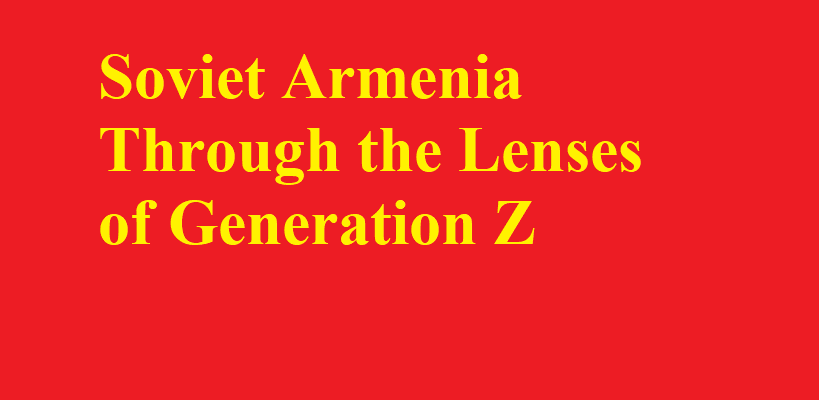
(Untitled)
Student: Armine Balayan
The interview was held on 03.09.2020 in Abovyan, Kotayk, Armenia.
The interviewee was born in 31.01.1952 in Sisian, Syunik, Armenia.
- Q: Were you a member of the Komsomol/Community Party? Can you recall how the membership began and why it was significant to become a party member?
A: No, I was not a member of the Kosmomol/Cummunity Party. It was not significant to become a party member, I had never been asked to.
- Q: Are there any family experiences with the Stalinist exterminations, repressions, concentration camps?
A: No, none of my family members ever experienced the Stalinist exterminations, repressions and concentration camps.
- Q: What was it like to live in Soviet Armenia?
A: Life was consolidated and comfortable. Products were very cheap. Meat, for example, costed only 2 rubles. Salaries were high instead. Medical service was free. There was no need to take loans…
- Q: Discuss your experience with the Soviet control over individuals/freedom of expressions.
A: We experienced the Soviet control for some national and spiritual holidays. Unfortunately, we did not have an opportunity to celebrate them. - Q: Were you employed? What was it like working in the Soviet Union (SU)? What were the benefits and downsides of working in the soviet system?
A: Yes, I started working at “Abovyan Maternity Hospital” in 1972. My husband was working at “Sirius” factory and at bookstore. Our salaries were enough to raise our four children and we were getting it twice a month: imprest in the beginning of the month and vage in the middle of it. There were trade unions providing money without additional percent. We had an opportunity to go to sanatoriums each year. Besides, we were registered for getting an apartment which we got.
- Q: Did you support the Soviet system? Explain the answer.
A: Yes, I definitely supported the Soviet system because of the advantages I have already mentioned. Though I was not involved and even interested in politics, but the fact that I just lived peacefully with my family was enough for me to support the Soviet system.
- Q: Did you feel victims of the Soviet system? Explain the answer.
A: No, I did not feel victim of the Soviet system at all. My family and I did not have any hardship until the end of 1980s. Life was easygoing.
- Q: Have you traveled outside of the SU? If yes, can you recall how the system worked for letting them out of the country?
A: I have not traveled outside of the SU but so did my husband. He traveled to Turkey and had been working there approximately for a year. But to go to Turkey he got a new passport, his name and nationality were changed and he was living there as another person for security reasons.
- Q: If you traveled outside of the SU, have your opinions of the SU changed?
A: When my husband returned from Turkey, he was drawing parallels very often, He mentioned not once that there was more control in Turkey than in the SU and when choosing from the two, he definitely preferred the second one.
- Q: If you lived through the 1970s and 80s, what were the 5 key turning points in Armenia’s social and political life that you remember the best?
A: I am sorry, I can’t answer this question. If my husband was alive, he would certainly mention not five but even more key points because he was very interested in Armenia’s social and political life. But I was too busy then working and raising four children.
- Q: What is your recollection of the Karabakh movement?
I remember the beginning of Karabakh movement very well. My aunt was living in Azerbaijan with her family then, and they were trying to come to Armenia because of the hardship and danger. They flew to Tbilisi, then to Yerevan. The next day Sumgait pogrom began…
The 1988 was really hard for us. No electricity, no heating, it was even hard to find bread to buy. We did not get salaries for months, but despite these difficulties, we did not complain and sometimes we even walked to Yerevan from Abovyan to participate in the demonstrations. Reunion of Karabakh and Armenia and restoration of justice were every Armenian’s wish then.
- Q: What was it like to see the collapse of the SU?
A: Till the 1985, I did not even expect the SU to collapse. But when Gorbachev came to power, short time was needed for that kind of whispers to appear. There were contradictory opinions. During the Karabakh movement Armenians already were talking about the referendum and getting independent. We were very excited but I also have to mention there was chaos in country. The transition period was hard for a lot of people, some of them had big financial losses, including us…
Conclusion
The aim of this interview is to explore the legacy of Soviet Armenia and discuss the Soviet past of Armenians. The interviewee’s attitude, in general, is positive. She was born in 1952 and she did not witness the Stalin-era Soviet Union. When Khrushchev came to power, as we know, some ideological changes started in Soviet Armenia. During the Brezhnev-era USSR already, unprecedented events took place in Armenia, and manifestations of Armenian nationalism were allowed. Thus, the interviewee does not think Armenians experienced the Soviet control over freedom of expressions. Nevertheless, because of the state atheism policy of USSR, national spiritual holidays were not allowed to be celebrated in Soviet Armenia, according to her.
Overall, the interviewee supported the Soviet system even she was not very interested in political life of the Union. But the fact that she was living peacefully with her family, as she mentions, was enough for her.
